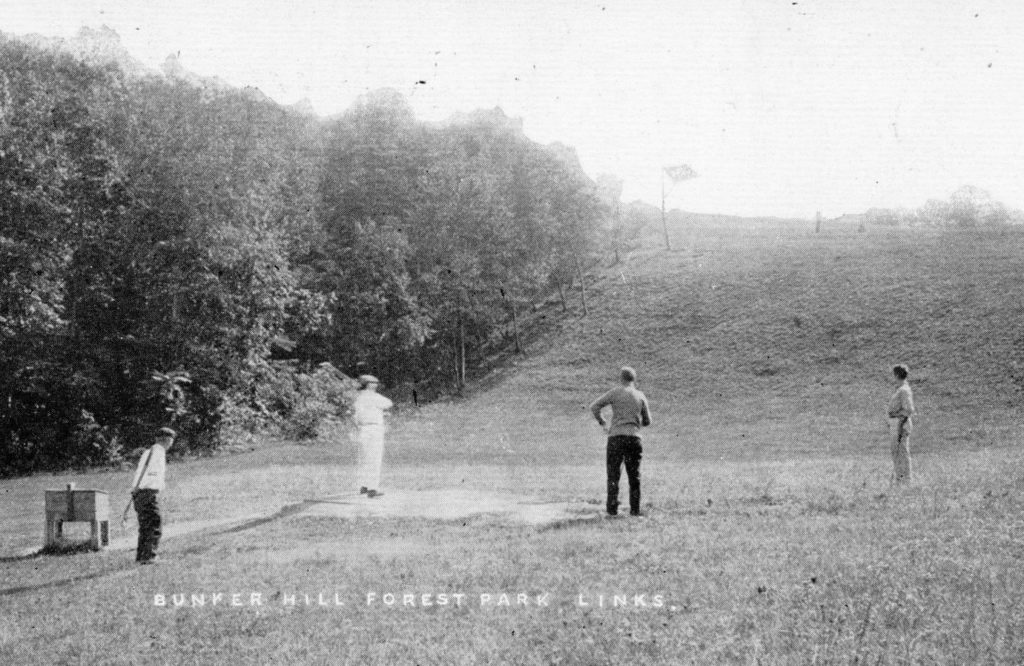By Ed Wendell

The Forest Park Golf Course, one of the few public golf courses in New York City, has been a big part of the Woodhaven landscape for 127 years. Forest Park itself is 128 years old and is rich with history and beauty.
This past weekend, we had the pleasure of giving a presentation on the history of Forest Park to a large group of volunteers who help maintain and beautify our park, which is now entering its 128th year. For a combination of beauty and history in Woodhaven, you’d be hard pressed to beat Forest Park.
Although much of Forest Park’s 538 acres consists of natural woodland, the park itself was planned and designed by landscape architect Frederick Law Olmsted. Originally envisioned as one giant, continuous park stretching from Brooklyn all the way to Jamaica (and originally called Brooklyn Forest), changes in population and the resulting development reduced the scope of that plan.
A nine-hole golf course was opened to the public and by 1905, the popularity of the golf course would prompt it to expand to 18 holes, originally stretching south all the way to Ashland Avenue, where residential homes marked the start of Woodhaven proper.
As part of the expansion, a Dutch Colonial golf clubhouse was built on the course in 1905 by the architectural firm of Helmle, Huberty & Hudswell, who also designed the landmark Williamsburgh Savings Bank tower in Brooklyn.
The golf course is still active and the beautiful clubhouse today is called Oak Ridge and serves as the home of the Forest Park Administration offices.
If you go east from the old clubhouse, you’ll eventually reach the Seuffert Bandshell (pronounced Soy-fert), a near 100-year old bandstand named after bandleader George Seuffert Sr.
For many years, Seuffert and his band entertained people at the bandshell and it was officially named in his honor in 1979.
A little further along, you’ll come across the Forest Park Carousel, which was designated as a landmark by the City of New York ten years ago, in 2013.
Artistically, the Forest Park Carousel is particularly notable as it was the handiwork of the legendary master carver Daniel Muller. Muller came to the United States from Germany as a child in the 1880s and as a young man he and his brother worked for Gustav Dentzel, a renowned carousel builder in his own right.
Dentzel’s father built carousels back in Germany going back to the mid-18th century. Muller took advantage of the opportunity to learn all of these old-world skills from Dentzel and blended it with his own realistic style to carve out a name for himself and in 1903, D.C. Muller and Bro. Company was founded.
Muller’s carvings were notable not only for being very beautiful and realistic; in some cases the carvings were militaristic, with horses sporting bugles, swords and canteens.
Over 14 years, D.C. Muller and Bro. created over a dozen carousels but, sadly, today only two remain: one in Cedar Point, Ohio, and ours right here in Forest Park.
The Forest Park Carousel contains three rows of carvings; the outer row contains 13 standing horses, three menagerie animals and two chariots. The inner two rows each contain 18 jumping horses (for a total of 36).
While the Forest Park Carousel is often referred to as a Muller carousel, you will also find a few carvings from Dentzel and Charles Carmel, another notable carousel artist of the same era, on the inner two rows.
Not far from the carousel you will find one of the most beautiful spots in New York City, the Greenhouse at Forest Park, which was designed by legendary greenhouse builders Lord & Burnham, who also built the New York Botanical Garden, the United States Botanic Garden in Washington D.C., and the Phipps Conservatory in Pittsburgh.
Flowers and plants throughout parks in Queens and Brooklyn are grown right here, as they have been for over 100 years.
And if you continue walking east you will cross Woodhaven Boulevard and reach Victory Field, a large recreation complex with baseball fields, a running track, and a handball court. Victory Field was named after the Unknown Soldier of World War 1.
Today the track portion of Victory Field is named after longtime Woodhaven Assemblyman, the legendary Frederick D. Schmidt.
Forest Park is full of beauty, but it is also full of history and visitors to the park 100 years ago would be pleasantly surprised to see so much of their history preserved and beloved by the current residents of Woodhaven and the many volunteers that tend to the park.
If you are interested in this presentation we will be repeating it via Zoom on Tuesday, Feb. 7 at 8 p.m. Email us at woodhavenhistory@gmail.com for a free invite.

